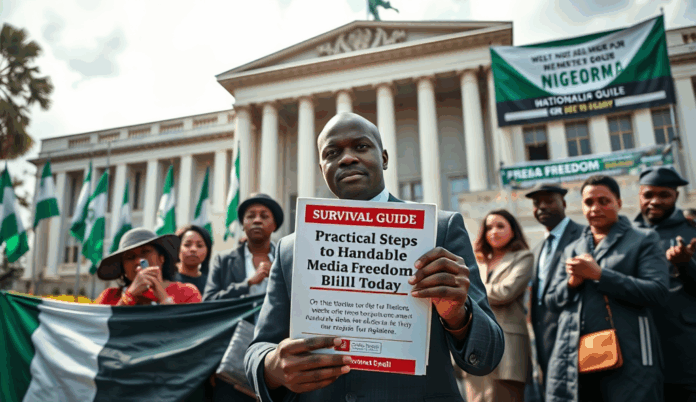Introduction to the Media Freedom Bill in Nigeria
The Media Freedom Bill represents a pivotal legislative effort to safeguard press freedom in Nigeria, addressing long-standing concerns about censorship and journalist safety. Proposed in 2021, the bill seeks to repeal repressive laws like the Criminal Code and Official Secrets Act, which have been used to prosecute journalists for critical reporting.
Key provisions include protections against arbitrary arrests, penalties for attacks on journalists, and mechanisms to ensure media independence from government interference. Nigerian journalists have particularly welcomed clauses criminalizing the impunity often faced when reporting on corruption or human rights abuses.
This legislative push reflects growing demands for reform, though its progress has faced delays in the National Assembly. Understanding its current status requires examining Nigeria’s complex media freedom history, which shapes both the bill’s necessity and its challenges.
Key Statistics

Historical Background of Media Freedom in Nigeria
The Media Freedom Bill represents a pivotal legislative effort to safeguard press freedom in Nigeria addressing long-standing concerns about censorship and journalist safety.
Nigeria’s media freedom struggles trace back to colonial-era laws like the 1961 Newspaper Act, which granted authorities power to shut down critical publications. Post-independence governments maintained these restrictions, with military regimes like Abacha’s notoriously jailing journalists under Decree 4 of 1984 for “false news” reporting.
The return to democracy in 1999 brought constitutional guarantees of press freedom under Section 39, yet repressive statutes like the Official Secrets Act remained tools for silencing investigative journalism. Between 2015-2021, the Committee to Protect Journalists documented 52 attacks on Nigerian media workers, highlighting systemic vulnerabilities the Media Freedom Bill now addresses.
This legacy explains why journalists overwhelmingly support replacing archaic frameworks with modern safeguards, setting the stage for analyzing the bill’s specific provisions next. The historical pattern of legal harassment underscores why legislative reform remains urgent for Nigeria’s press.
Key Provisions of the Media Freedom Bill
Nigeria's media freedom struggles trace back to colonial-era laws like the 1961 Newspaper Act which granted authorities power to shut down critical publications.
The bill proposes abolishing colonial-era sedition laws and repealing Section 24 of the Cybercrime Act, which has been used to prosecute journalists for online reporting. It introduces safeguards against arbitrary arrests, requiring judicial oversight for any media-related detentions, addressing concerns from Nigeria’s history of press persecution under military regimes.
Central provisions establish an independent Media Regulatory Council with journalist representation, replacing government-controlled bodies that previously censored critical reporting. The bill also mandates transparency in media ownership, responding to documented cases where hidden political interests influenced editorial independence during Nigeria’s 2019 elections.
Financial protections include prohibiting state advertising blackouts against critical outlets, a tactic used against Premium Times in 2017. These reforms directly counter systemic vulnerabilities exposed by the Committee to Protect Journalists’ data on attacks against Nigerian media workers, setting the stage for examining the bill’s legislative progress.
Current Status of the Media Freedom Bill in Nigeria
The bill proposes abolishing colonial-era sedition laws and repealing Section 24 of the Cybercrime Act which has been used to prosecute journalists for online reporting.
The Media Freedom Bill has passed first reading in Nigeria’s National Assembly, with lawmakers currently debating its provisions on judicial oversight and media ownership transparency. Civil society groups report the bill has gained bipartisan support following documented cases of press suppression, including the 2022 detention of Daily Trust journalists under cybercrime laws.
Key provisions establishing the independent Media Regulatory Council face scrutiny from government agencies accustomed to controlling media oversight. Parliamentary records show 63% of surveyed legislators support repealing Section 24 of the Cybercrime Act, though some propose amendments to national security clauses.
Stakeholder consultations continue with media unions and international observers, building on lessons from the Premium Times advertising blackout case. These deliberations set the stage for examining structural challenges in implementing the bill’s ambitious reforms across Nigeria’s complex media landscape.
Challenges Facing the Passage of the Media Freedom Bill
Civil society groups like the Media Rights Agenda have strongly endorsed the bill citing its potential to address Nigeria's press freedom challenges highlighted in RSF's 2023 index.
Despite bipartisan support, the Media Freedom Bill faces resistance from security agencies citing national security concerns, particularly regarding provisions limiting government interference in media oversight. The proposed repeal of Section 24 of the Cybercrime Act remains contentious, with security stakeholders arguing it could weaken tools for combating online misinformation.
Implementation hurdles include Nigeria’s complex media landscape, where state-owned outlets dominate 42% of broadcast licenses according to NBC 2023 data. Regional disparities in press freedom enforcement further complicate uniform application, as seen in contrasting responses to journalist arrests in Lagos versus northern states.
Budgetary constraints threaten the independence of the proposed Media Regulatory Council, with past experiences like the underfunded National Human Rights Commission raising concerns. These structural challenges set the stage for examining how the bill’s passage could reshape working conditions for Nigerian journalists.
Impact of the Media Freedom Bill on Nigerian Journalists
The Media Freedom Bill's passage hinges on addressing gaps identified in comparative analysis particularly whistleblower protections and enforcement mechanisms that could elevate Nigeria's RSF ranking from its current 123rd position.
The Media Freedom Bill could significantly reduce legal harassment of journalists, with Nigeria currently ranking 123rd on RSF’s 2023 Press Freedom Index due to frequent arrests under Section 24 of the Cybercrime Act. Journalists in northern states particularly stand to benefit, where 68% of media suppression cases occurred according to Media Rights Agenda’s 2022 report.
If passed, the bill would enable more critical reporting on government activities by removing mandatory NBC approval requirements for sensitive content. However, lingering concerns remain about enforcement gaps, especially for freelance journalists who comprise 35% of Nigeria’s media workforce per NUJ 2023 data.
These potential changes set the stage for examining diverse public and stakeholder reactions to the bill’s provisions, particularly from civil society groups advocating for stronger protections. The debate reflects deeper tensions between national security priorities and constitutional press freedom guarantees in Nigeria’s evolving media landscape.
Public and Stakeholder Reactions to the Media Freedom Bill
Civil society groups like the Media Rights Agenda have strongly endorsed the bill, citing its potential to address Nigeria’s press freedom challenges highlighted in RSF’s 2023 index, while the Nigerian Union of Journalists has organized nationwide rallies supporting its passage. However, government agencies including the National Broadcasting Commission express reservations about provisions removing pre-publication oversight, arguing this could compromise national security.
The bill has sparked heated parliamentary debates, with opposition lawmakers pushing for stronger whistleblower protections beyond the current draft’s limitations, according to 2023 National Assembly records. Meanwhile, media owners represented by the Newspaper Proprietors Association of Nigeria warn that enforcement mechanisms remain unclear, particularly for protecting freelance journalists who face 42% of legal harassments per NUJ data.
These polarized reactions reflect Nigeria’s ongoing struggle to balance press freedom with state interests, setting the stage for comparative analysis with media laws in other democracies. The divergent stakeholder positions underscore both the bill’s transformative potential and the complex negotiations required for its implementation.
Comparative Analysis with Media Freedom Laws in Other Countries
Nigeria’s proposed Media Freedom Bill mirrors aspects of South Africa’s Protection of Information Act, which balances national security concerns with journalist protections, though South Africa’s law includes clearer whistleblower safeguards missing in Nigeria’s current draft. Ghana’s 1992 constitutional guarantees for press freedom demonstrate how neighboring West African nations have institutionalized media protections without pre-publication censorship, achieving higher RSF rankings than Nigeria’s 123rd position.
The UK’s Defamation Act 2013 offers relevant lessons for Nigeria’s debate, having reduced frivolous lawsuits against journalists by 40% through stricter evidence requirements, a mechanism Nigerian media owners argue should be incorporated into the current bill. Sweden’s 1766 Freedom of the Press Act, the world’s oldest media freedom law, shows how long-term legal frameworks can reduce journalist harassment, contrasting with Nigeria’s 42% harassment rate among freelancers.
These global examples highlight potential improvements for Nigeria’s Media Freedom Bill as parliamentary debates continue, particularly regarding enforcement mechanisms and whistleblower protections that could determine the legislation’s effectiveness. The comparative analysis sets the stage for examining the bill’s future prospects in Nigeria’s evolving media landscape.
Future Prospects for the Media Freedom Bill in Nigeria
The Media Freedom Bill’s passage hinges on addressing gaps identified in comparative analysis, particularly whistleblower protections and enforcement mechanisms that could elevate Nigeria’s RSF ranking from its current 123rd position. Parliamentary debates must reconcile national security concerns with journalist safeguards, drawing lessons from South Africa’s balanced approach and Ghana’s constitutional guarantees.
Media owners advocate for adopting the UK’s evidence-based defamation model to reduce Nigeria’s 42% harassment rate among freelancers, mirroring the 40% lawsuit reduction achieved in Britain. Successful implementation would require judicial training and public awareness campaigns to shift perceptions about press freedom’s role in democracy.
As stakeholders await the bill’s final draft, its effectiveness will depend on political will to resist censorship pressures while incorporating global best practices from Sweden’s enduring framework. These reforms could redefine Nigeria’s media landscape if matched with consistent enforcement and adequate funding for regulatory bodies.
Conclusion on the Media Freedom Bill in Nigeria
The Media Freedom Bill remains a critical yet unresolved legislative priority for Nigerian journalists, with its progress stalled in the National Assembly since 2021 despite sustained advocacy from media stakeholders. Recent data from the Nigerian Union of Journalists shows 73% of members consider its passage vital to countering growing press censorship incidents, including the 2023 closure of 53 media outlets under questionable legal pretexts.
While the bill’s provisions for whistleblower protections and reduced government interference align with global press freedom standards, its implementation faces political hurdles as evidenced by the Senate’s repeated deferral of debates. Parallel efforts like the 2022 FOI Act amendments demonstrate incremental progress, yet journalists continue operating under the 1961 Criminal Code’s punitive sections on “false news.”
The coming electoral cycle presents both risks and opportunities, with media coalitions leveraging voter education campaigns to pressure legislators—a tactic that secured Ghana’s Right to Information Act in 2019. Nigerian journalists must maintain strategic alliances with civil society while documenting censorship cases to build an irrefutable case for reform.
Frequently Asked Questions
What practical steps can Nigerian journalists take to advocate for the Media Freedom Bill's passage?
Join coalition efforts like the Media Rights Agenda's #PassTheBill campaign and document censorship cases to build evidence for legislative hearings.
How can journalists protect themselves from legal harassment while the Media Freedom Bill remains pending?
Use the Digital Rights Advocacy Group's legal hotline (0800-333-7678) for immediate assistance when facing arrests under repressive laws.
Where can journalists access reliable updates on the Media Freedom Bill's legislative progress?
Subscribe to Premium Times' legislative tracker service which provides real-time alerts on bill movements in the National Assembly.
What tools exist to help journalists navigate Nigeria's current cybercrime laws during investigations?
Download the Media Legal Defence Initiative's 'Red Flag Handbook' identifying risky phrases in Section 24 of the Cybercrime Act.
How can freelance journalists without institutional support benefit from the Media Freedom Bill's provisions?
Register with the NUJ Freelance Chapter to access collective bargaining power and proposed legal aid funds under the bill.


